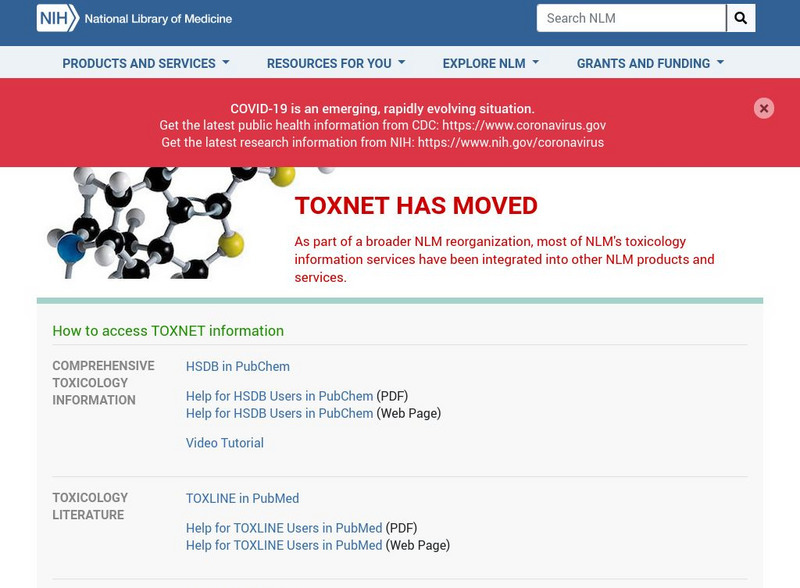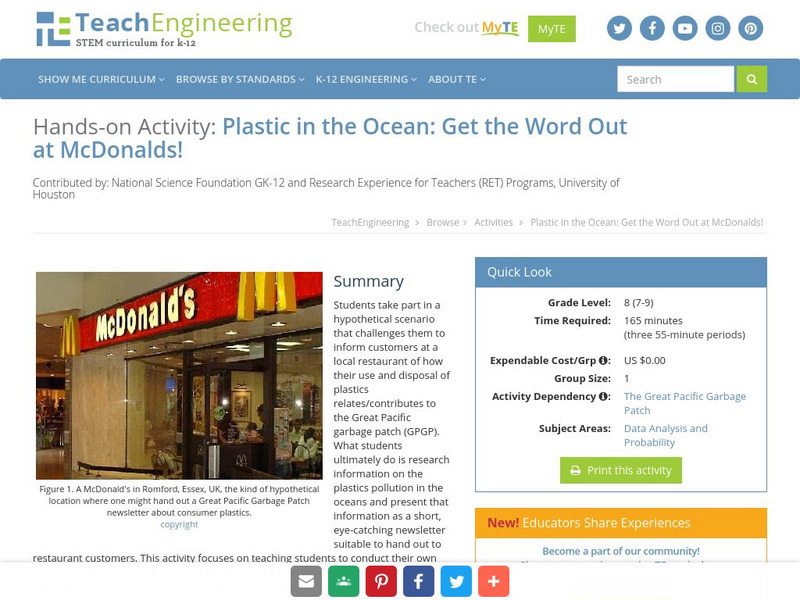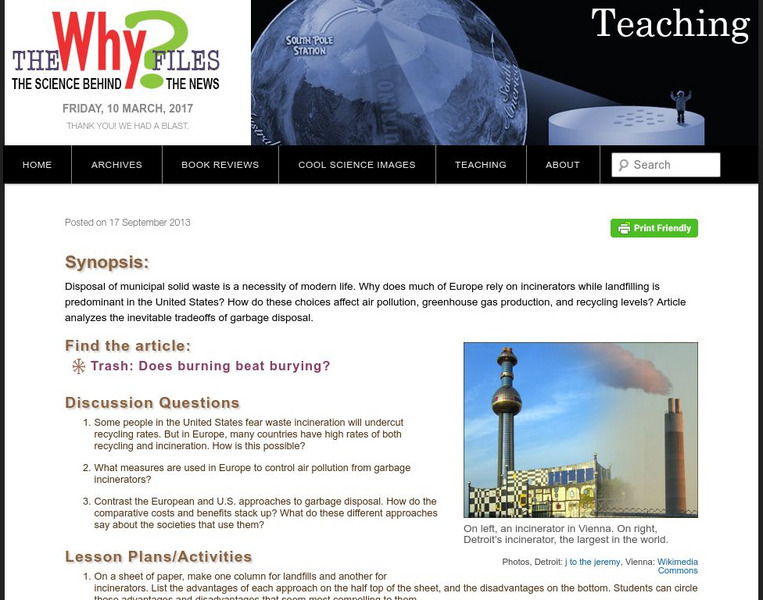TeachEngineering
Teach Engineering: 3 Rc (Reduce, Reuse, Recycle and Compost)
For this lesson, young scholars expand their understanding of solid waste management to include the idea of 3RC (reduce, reuse, recycle and compost). They will look at the effects of packaging decisions (reducing) and learn about...
TeachEngineering
Teach Engineering: Trash Talkin'
In this activity, students collect, categorize, weigh and analyze classroom solid waste. The class collects waste for a week and then student groups spend a day sorting and analyzing the garbage with respect to recyclable and non...
TeachEngineering
Teach Engineering: Composting Nature's Disappearing Act
In this activity, students explore the idea of biodegradability by building and observing a model landfill. This serves as an introduction to the idea of composting. Students learn about the role of engineering in solid waste management.
TeachEngineering
Teach Engineering: This Landfill Is a Gas!
In this activity, students work as engineers to build and observe a model landfill. They will understand the process and pitfalls of the use of landfills as a method for the waste disposal.
TeachEngineering
Teach Engineering: Environment
Through 10 lessons and more than 20 hands-on activities, students are introduced to the concept of an environment and the many interactions within it. As they learn about natural and human-made environments, as well as renewable and...
TeachEngineering
Teach Engineering: Dome It Challenge
Students brainstorm, identify, and explore the pathways where their food, water, and energy originate, and where wastewater and solid waste go. They learn that resources are interdependent and that recycling wastes into resources is key...
Other
Clean Sweep u.s.a.: Energy to Burn [Pdf]
This informative and interactive site examines how we can get power from garbage. Topics include: waste to energy plants, only ash remains, a bright idea, and more.
Other
King County: Household Hazardous Waste
Characteristics of hazardous waste products are provided on this site. Alternatives to use which will not harm the environment are also explained.
Annenberg Foundation
Annenberg Learner: Garbage: Hazardous Waste Solutions
This concise article explores possible solutions to the hazardous waste problem.
Other
E Jnet: The Basics of Landfills
This website answers most questions reguarding landfills. Learn what landfills are and how they are constructed. In addition to providing responses to several simple uestions, this website includes links to several related resources.
Georgia Department of Education
Ga Virtual Learning: Environmental Science: Mineral and Energy Resources
Students explore the topics of mineral extraction, renewable and nonrenewable resources, and hazardous wastes in this comprehensive, interactive module.
Other
Association of Science Technology Centers: Rotten Truth About Garbage
This comprehensive website includes activities, time lines, definitions, statistics, and information to help you see garbage in a new light. Of special interest is a page that shows all of the resources that go into the production of a...
Environmental Education for Kids
Eek!: Teacher Resources: My Ton of Trash (Lesson Plan)
Here you can find an engaging lesson plan on the trash each individual generates over time. Students will learn how trash is generated, how trash is disposed of, and possible ways to reduce the amount of trash.
Other
Recycling Revolution: Recycling Facts
Lists facts about recycling aluminum, paper, plastic, and glass, and about solid waste and landfills.
Other
Commercial Paving and Recycling
This site describes products, services, and technology incorporated to recycle construction and demolition wastes in order to reduce the amount of waste destined for the landfill.
Illustrative Mathematics
Illustrative Mathematics: G Mg Ice Cream Cone
You have been hired by the owner of a local ice cream parlor to assist in his company's new venture. The company will soon sell its ice cream cones in the freezer section of local grocery stores. The manufacturing process requires that...
Council for Economic Education
Econ Ed Link: Dumptown, Usa: Making a Ton of Difference
The amount of trash produced in the United States is mounting with each passing year. Communities are finding it increasingly difficult and costly to handle trash disposal. Recycling is considered a key solution to the garbage problem....
National Institutes of Health
National Institutes of Health: Household Products Database
Everything you ever wanted to know about every household product available, from battery disposal to detergent and glue.
TeachEngineering
Teach Engineering: Get the Word Out at Mc Donalds!
Students take part in a hypothetical scenario that challenges them to inform customers at a local restaurant of how their use and disposal of plastics relates/contributes to the Great Pacific garbage patch (GPGP). What students...
eSchool Today
E School Today: Sources of Land Pollution
Short descriptions of various sources of solid and semi-solid pollutants that affect land and soil resources.
University of Wisconsin
The Why Files: What to Do With Trash?
Explore the pros and cons of placing trash in landfills or incinerating it.
Science Education Resource Center at Carleton College
Serc: Bot Ec: Percentage of Copper in Ore
Suppose that you are building a new house. It will take about 90 kg (198 pounds) of copper to do the electrical wiring. In order to get the copper in the first place, someone needs to mine solid rock that contains copper, extract the...
Other popular searches
- Solid Waste Management
- Solid Waste Disposal
- History of Solid Waste
- Municipal Solid Waste
- Solid Waste Managment
- Solid Waste Periodic Table
- Transform Solid Waste
- Solid Waste Products
- Solid Waste Activities
- Solid Waste Removal
- Household Solid Waste
- Solid Waste Takes Over

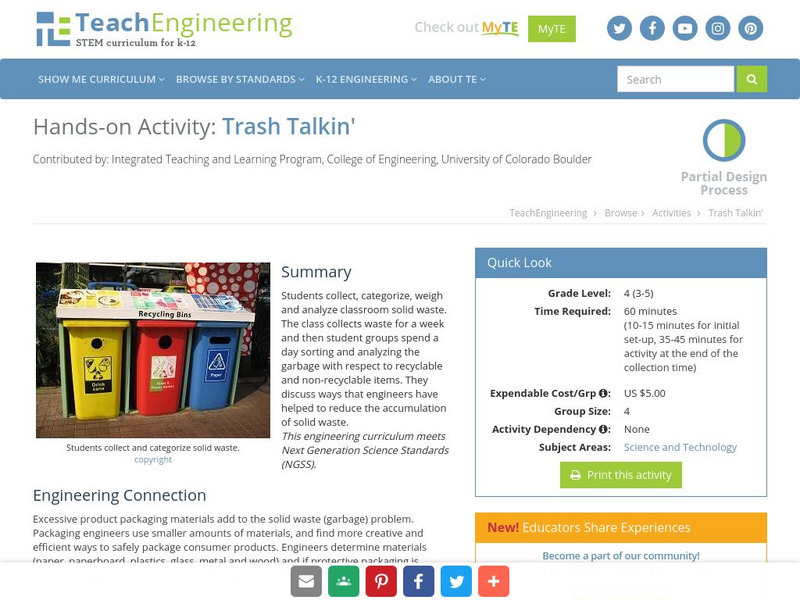
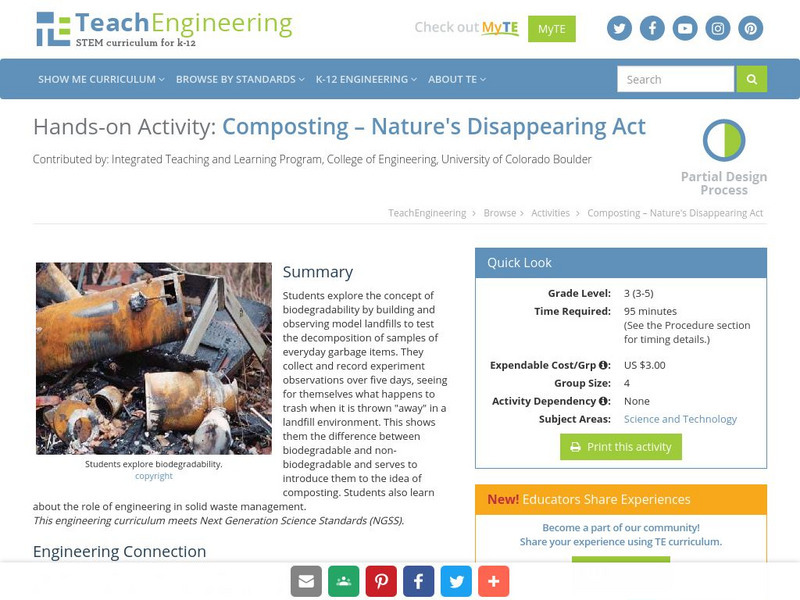



![Clean Sweep u.s.a.: Energy to Burn [Pdf] Activity Clean Sweep u.s.a.: Energy to Burn [Pdf] Activity](https://static.lp.lexp.cloud/images/attachment_defaults/resource/large/FPO-knovation.png)







